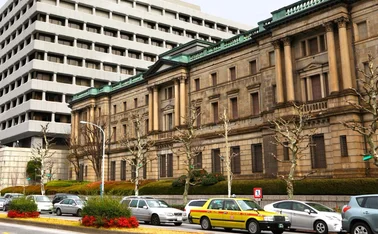
RBI’s Rajan warns of possible asset price collapse; euro ‘too strong’
IMF set to investigate spillovers effects linked with central bank policies

Poor policy co-ordination and a continued failure to comprehend the dangers of financial cycles pose significant risks to the global economy at a time when central banks may be least equipped to deal with crises, Raghuram Rajan, governor of the Reserve Bank of India (RBI), says in an interview published by Central Banking journal today.
Rajan says problems do not appear to be arising from credit growth – although this is an issue in some emerging markets – rather from the rise in asset prices as investors around the world chase yields. The former chief economist of the International Monetary Fund fears a build-up of financial sector imbalances could cause sudden price reversals and sharp spikes in volatility. "We are taking a greater chance of having another crash at a time when the world is less capable of bearing the cost," he says.
"Unfortunately, a number of macroeconomists have not fully learned the lessons of the great financial crisis. They still do not pay enough attention – en passant – to the financial sector. Financial sector crises are not as predictable. The risks build up until, wham, it hits you," Rajan says.
Rajan fears central banks "may be exhausting room on the financial side and creating a situation where there will be a discontinuous movement in the financial sector".
A sudden shift in asset prices could happen in a variety of ways. The most obvious route would be as a result of investors chasing higher yields at a time when they believe central bank policies will protect them against a fall in prices. "They put the trades on even though they know what will happen as everyone attempts to exit positions at the same time – there will be major market volatility," says Rajan. "True, it may not happen if we can find a way to unwind everything steadily. But it is a big hope and prayer."
Unfortunately, a number of macroeconomists have not fully learned the lessons of the great financial crisis. Financial sector crises are not as predictable. The risks build up until, wham, it hits you
IMF set to act on spillovers
Rajan also calls for more policy co-ordination and research into the effects of central bank policy spillover and spillbacks. The RBI governor says monetary policy changes by developed-world central banks can cause "substantial levels of uncertainty" at a time that may suit the policy instigator but not be convenient for other central banks, notably in those in emerging markets.
Rajan says the IMF "has recently suggested it is going to examine" central bank monetary policies, not "with a view of blessing them unilaterally but by trying to see if on net they are beneficial".
He says this was a major change in the IMF's stance. "The sensitivity this kind of discussion raises in central banks will make them think about the value of policies and whether they are helpful elsewhere," says Rajan. "I have no doubt that countries will still do what is largely in their interest. But over time we need a little more effort looking at the global interest. My sense is that once the debate is engaged, we will figure out a way to move in that direction."
Euro is ‘too strong'
Rajan says the eurozone faces similar problems to emerging market economies, as it is affected by spillovers from ultra-loose monetary policies being pursued by the central banks such as the Federal Reserve, Bank of Japan and Bank of England. The RBI governor pointed out that Europe faces a disinflationary environment, close to deflation, despite pursuing a "very, very accommodative policy".
Eurosystem policy appears un-accommodative, he said, "because everyone else's policy is even more accommodative".
"The exchange rate is too strong given the euro area's economic standing," Rajan says. "In a world where demand is weak and not strongly influenced by monetary policy, the effect of monetary policy may be more in ‘demand shifting' that is operating through the exchange rate, rather than ‘demand creation' that is operating through credit growth and credit flows domestically."
Rajan compared the state of affairs today as similar to that witnessed before World War II. "We are back to the 1930s, in a world of ‘competitive easing'. Back then, it was competitive devaluation, but competitive easing could lead to competitive devaluation," says Rajan. "If there were no consequences, to competitive easing, fine; but there are consequences."
In the interview, Rajan also explains how he has moved to address inflation and exchange rate policies in India, his reaction to the appointment of new Indian prime minister Narendra Modi, and the RBI's views on foreign exchange controls, reserves management, rupee internationalisation, banking licence approvals and capital markets development.
"Raghuram Rajan shot to international prominence when he stood up at the central bankers' convention in Jackson Hole in 2005 and explained why he thought the Great Moderation may come to a sudden end," says Christopher Jeffery, editor of Central Banking (Twitter: @CB_Editor). "He was rounded on by much of the US establishment, but his views turned out to be far more prescient than those of his critics. He has already established his credentials leading one of the world's largest central banks less than a year into the job and is considered a leading thinker among central bank governors around the world."
Only users who have a paid subscription or are part of a corporate subscription are able to print or copy content.
To access these options, along with all other subscription benefits, please contact info@centralbanking.com or view our subscription options here: subscriptions.centralbanking.com/subscribe
You are currently unable to print this content. Please contact info@centralbanking.com to find out more.
You are currently unable to copy this content. Please contact info@centralbanking.com to find out more.
Copyright Infopro Digital Limited. All rights reserved.
As outlined in our terms and conditions, https://www.infopro-digital.com/terms-and-conditions/subscriptions/ (point 2.4), printing is limited to a single copy.
If you would like to purchase additional rights please email info@centralbanking.com test test test
Copyright Infopro Digital Limited. All rights reserved.
You may share this content using our article tools. As outlined in our terms and conditions, https://www.infopro-digital.com/terms-and-conditions/subscriptions/ (clause 2.4), an Authorised User may only make one copy of the materials for their own personal use. You must also comply with the restrictions in clause 2.5.
If you would like to purchase additional rights please email info@centralbanking.com test test test








